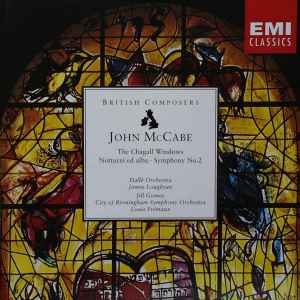|
Landscape artist
Three orchestral works by John McCabe on CD
|


To listen to the aural illustrations in this review, you may need to download
RealNetworks' realplayer G2.
|
 John McCabe's orchestral landscapes glow with colour and
he's truly an artist. His language and technique are derived as an amalgam
of many influences, and it is likely that he functions more assuredly as
an artist this way than if a dominant personality had forced anarchy. John McCabe's orchestral landscapes glow with colour and
he's truly an artist. His language and technique are derived as an amalgam
of many influences, and it is likely that he functions more assuredly as
an artist this way than if a dominant personality had forced anarchy.
Of the three works played here the oldest is Notturni ed alba,
first performed by Sheila Armstrong and the CBSO under Louis Fremaux at
the Hereford Three Choirs Festival in 1970. It sings of the night, setting
several suitable Latin poems. My knowledge of McCabe's music of that time
leads to the firm conclusion that this work concluded his first period,
with the other two works here recorded from the next.
Notturni's atmosphere is cast quickly, like a backdrop. Darkness obliterates,
the hymn before sleep (click for music) is both disturbing
yet wearisome. The mood changes to longing before dreams mock and fears
unsettle the mind. As dawn slowly breaks and the sun rises, the music and
spirit rise with it to meet the new day. Enthusiasm for this work goes back
to my presence at the song cycle's first performance, which I recall generating
much attention. (Jill Gomez, who made the recording, sings with both beauty
and atmosphere.)
 McCabe's Chagall Windows is stylistically in a similar
mould, although of greater length and conceived differently. The composer
was much taken with Marc Chagall's stained glass windows for the university
medical centre in Jerusalem. Almost instantaneously on seeing photographs,
McCabe resolved to put his feelings into music. As Granada TV had decided
upon a documentary depicting the birth of a new orchestral work from commission
(in this case, the Hallé Orchestra) to first performance, they picked
on this work of McCabe, and flew him out to see the windows in situ. McCabe's Chagall Windows is stylistically in a similar
mould, although of greater length and conceived differently. The composer
was much taken with Marc Chagall's stained glass windows for the university
medical centre in Jerusalem. Almost instantaneously on seeing photographs,
McCabe resolved to put his feelings into music. As Granada TV had decided
upon a documentary depicting the birth of a new orchestral work from commission
(in this case, the Hallé Orchestra) to first performance, they picked
on this work of McCabe, and flew him out to see the windows in situ.
As the composer has made clear, this work is not programmatic, rather
a one-movement symphony shaped by the subject matter of the twelve windows
and seen essentially as diversity in unity. Five years on from Notturni,
McCabe is consistent in style and evolving his processes towards a richer
quality of structural balance and development. Chagall's conception of the
twelve tribes of Israel is the pivot on which this music rests, and from
the result McCabe has given his conception imaginative force and quality.
(click for music)
Symphony 2 closely followed Notturni ed Alba, to be premièred
by Frémaux and the CBSO in September 1971. Consequently, it has overtones
of the earlier work, although it is looking forward and new subtleties of
development are evident. The composer tells us that the film The Wild
Bunch had links with his thinking when he was planning the new symphony.
The succession of moods in the five sections are varied, although an overall
feeling of suppression is felt as bursts of energy flare up and down after
the first section, mostly followed with quiet unease. Rarely is total relaxation
present, (click for music) so McCabe is evidently
expressing strong feelings that animate the music. And that is vital for
motivating creative power.
Since this music of 20 years ago, John McCabe has progressed along his
chosen line remaining true to his feelings, and consequently composing always
with strong purpose and a masterly skill in projecting it to the listener.
Copyright © Basil Ramsey,
August 28th 1999
JOHN McCABE
The Chagall Windows *
Notturni ed alba +
Symphony No 2 +
* Hallé Orchestra / James Loughran
+ Jill Gomez with the City of Birmingham Symphony Orchestra
/ Louis Frémaux
EMI Classics CDM 5 67120 2 ADD
TT: 75'20
This compilation copyright (P) 1999 EMI Records Ltd.
Series Editor, Richard Abram
ORDER THIS CD FROM CROTCHET
Hear the Presteigne Festival Orchestra play John McCabe's Red
Leaves
live at the Presteigne
Festival tonight.
'John McCabe is one of the most talented and versatile figures
on the British Music scene, excelling as composer, performer and academic'
- BBC Music Magazine, June 1999 |
<< Music &
Vision homepage More CD reviews >>
|